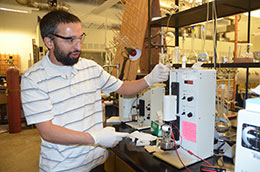Dec 5 2014
Scientists at the University of Wyoming (UW) are exploring ways to develop cost-effective, eco-friendly, and more efficient fuel cell technology. Although currently commercially available, fuel cells are not cost effective when compared to other sources of energy.
 UW graduate student Yagya Regmi works in a UW Physical Sciences Building laboratory to test the effectiveness of catalysts in hydrogen fuel cells. (UW Photo)
UW graduate student Yagya Regmi works in a UW Physical Sciences Building laboratory to test the effectiveness of catalysts in hydrogen fuel cells. (UW Photo)
Yagya Regmi, Ph.D. student at UW, is using a combination of metals which may have be used as alternative fuel cell catalysts. The aim of the study is not only to reduce the cost of fuel cells by removing precious and expensive metals, like platinum, but also to enhance the stability and efficiency of such catalysts. Regmi was guided by Brian Leonard, who serves as assistant professor at UW.
Fuel cells produce heat and electricity, releasing water as a byproduct. In order to trigger this chemical reaction, catalysts are required. Platinum nanoparticles are commonly used for this purpose, but these particles are expensive and tend to lose their effectiveness restricting the lifespan of fuel cells.
Regmi has been studying other types of metals to act as alternative fuel cell catalysts, such as tungsten and molybdenum integrated with carbon. He also amalgamated common metals such as nickel, iron and cobalt with molybdenum and tungsten to produce bimetallic carbide crystals as alternative fuel cell catalysts.
Over the course of four years, Regmi developed the catalysts and is now studying their efficiency for fuel cell reactions. Although these catalysts are not as effective as platinum, Regmi has significantly enhanced their design and production.
Although correct combination of carbon and metals to create alternative crystals is yet to be discovered, immense potential exists for multimetallic carbides nanoparticles, which could be leveraged to serve as fuel cell catalysts.
Meanwhile, hydrogen offers a promising source of energy because the process does not create carbon dioxide. In fact, Toyota and Honda have introduced fuel cell-cars, and hydrogen filling stations are being launched in California.
Apart from this, the use of fuel cell technology to charge laptops and cell phones is already happening and may possibly be used to power homes and buildings in the near future.
Hydrogen Fuel Cell
How does a Hydrogen Fuel Cell work? - YouTube DigitalSplashMedia